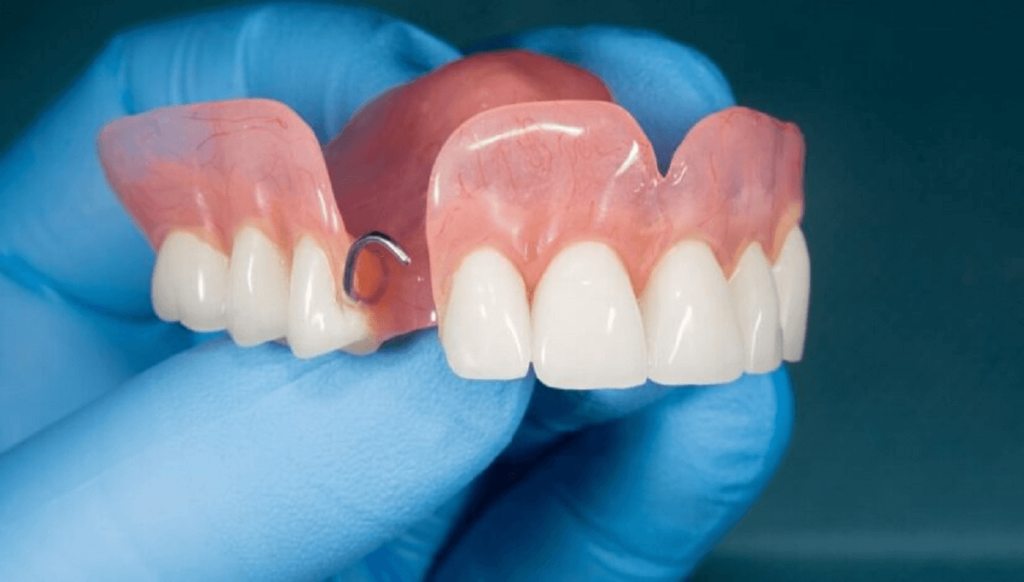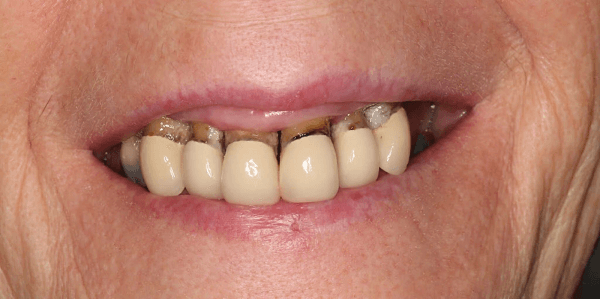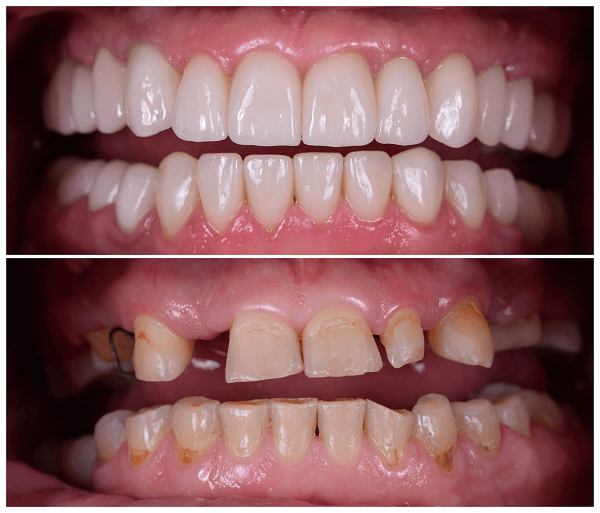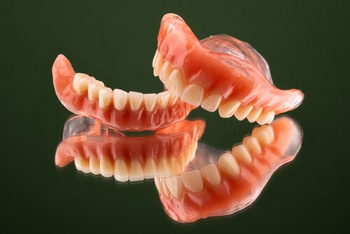Losing natural teeth due to cavities, gum disease (periodontal disease), and trauma is very painful. It can hurt your smile and confidence, and influence the chewing pattern. Most people feel reluctant to talk or smile in a gathering or official meeting due to shyness.
However, intermediate dentures save you from the hassle of losing confidence in public places.
Immediate dentures are false or fake teeth used to replace dead or decayed teeth. They fill the space right away, so you don’t have to wait months for healing. In this article, you will explore the overview of immediate dentures, their pros and cons, and how long do immediate dentures last. Keep reading to explore more.

How Immediate Dentures Work?
Basically, the immediate dentures are made before your dead natural teeth are removed. The dentist takes a mold of your mouth. They study how your teeth fit and where they sit. Then, the lab uses this mold to make your new denture. It’s ready before the day of your surgery.

The main goal of immediate dentures is to give you teeth the same day your real ones come out. It helps you chew, speak, and smile without waiting months. It also supports your mouth as it heals. The working idea is simple: replace teeth right away so you don’t feel embarrassed.
What to Expect with Immediate Dentures?
The process of placing immediate dentures involves certain guidelines or requirements. You need to make certain adjustments before replacing the old teeth with new dentures. Let’s explore it in a step-by-step process.

Step 1: Pre-Treatment Consultations and Customization
Before you begin anything, the dentist does a full mouth scan with the help of a scanner. The scanner should be equipped with attest technology to take a fast scan.
Aidite scanner provides the fastest scan with great precision and accuracy. This helps map the teeth and soft tissue. The lab uses this data to make a custom denture. The dentist chooses tooth color, shape, and size. It decides how the final denture will look and fit.
Step 2: The Day of Extraction and Placement
On the big day, the dentist removes the old teeth. Once the teeth are out, the denture is placed right away. This helps protect the gums and controls bleeding. The dentist checks the bite and makes quick changes if needed. During this process, the pain and swelling are normal.
Step 3: Adjusting to the Dentures: First 72 Hours
The first 3 days are the toughest. Patients may feel slight pressure, tightness, or sore spots. That’s normal. The mouth is healing and changing fast. Dentists often schedule a follow-up visit within 48–72 hours. They check for sore spots, adjust pressure points, and trim areas that rub. The doctor recommended soft food for the patient and care during the healing time.
Step 4: Speech, Chewing, and Overall Adaptation
In this step, the doctor tests the talking and chewing ability of the patient who is wearing new dentures. Patients might lisp or bite their cheeks. That’s normal too. They ask the patient to speak slowly.
The doctor also recommends that the patient start with soft foods and chew slowly. If the slipping can happen during this healing process, it means the patient needs a minor fix. It’s important to keep the patients calm and informed, which makes the whole process.
How Much Do Immediate Dentures Cost?
The Immediate dentures cost depends on several factors. The location where you live, what materials are used, and how many teeth are removed impact the average cost. Some are of the world; dentists charge higher due to experience and clinic locations.
All these factors make the final Immediate dentures cost vary in different regions. Dentists should explain all costs clearly. Patients should know what’s included and what may cost more later. Here is the price range that changes from place to place.

| Region | Estimated Cost (USD) |
| USA (Urban) | $1,800 – $3,500 |
| USA (Rural) | $1,200 – $2,500 |
| UK | £800 – £1,800 |
| Canada | $1,500 – $3,000 CAD |
| Australia | $1,000 – $4,000 AUD |
Pros and Cons of Immediate Dentures
Immediate dentures are the fastest way to replace old, dead, or damaged teeth. They help people smile, talk, and eat right after tooth removal. But like all dental tools, they have good and bad sides. Below are some simple pros and cons to guide the choice.

Pros
- Patients get new teeth the same day as extractions.
- The denture feels like a shield over sore areas.
- You can easily talk and speak when the dentures are placed.
- Patients can eat soft foods without long delays or pain.
- The fake teeth are like natural teeth that save patients from the embarrassment of missing teeth.
- Dentures help stop the sagging of cheeks and lips.
- The quick replacement eases the shock of losing teeth.
Cons
- Sometimes the gums shrink, so the denture needs refitting or a reline.
- The healing process takes time and needs follow-ups, and small fixes.
Where Are Immediate Dentures Commonly Used?
Immediate dentures are used in many dental cases. Dentists use them when quick tooth replacement is needed. Dental labs play a key role in getting the denture ready before surgery. Below are some common cases where immediate dentures are the best choice.
– Emergency Tooth Replacement
When a patient loses teeth from injury, they need a quick fix. The wait for weeks without teeth can cause stress for you. Immediate dentures give you a fast solution. You can talk, smile, and eat again within hours. This keeps you calm and restores function quickly.

– Full Mouth Extractions
In full-mouth cases, where all teeth must be pulled, patients fear being left toothless. Immediate dentures help avoid that. Dentists plan ahead by taking molds and bite records early. On extraction day, the dentures are placed as soon as the teeth are removed. This gives patients full coverage right away.
– Aesthetic Priorities for Front Teeth
Losing front teeth makes you look totally weird. It affects how people look and feel. Immediate dentures are often used when front teeth are damaged. This keeps the patient’s smile looking natural. A well-made denture helps keep speech clear and face shape balanced.
– Transitional Prosthetic Before Implants
Some patients want implants but can’t get them right away. They need time for healing or bone grafts. In the meantime, immediate dentures work as a temporary fix. They keep the space filled and protect the gums. Labs can design these dentures to be adjusted or relined later.
How Long Do Immediate Dentures Last?
Immediate dentures usually last between 6 months and 2 years. However, it can vary depending on adjustment and the patient’s mouth cleaning or eating habits. After teeth are removed, the gums and bones begin to shrink. This makes the denture loose as healing continues. That’s why dentists often suggest a reline or replacement after full healing.
Relining helps improve the fit by adding material inside the denture base. It’s common to do this after 3 to 6 months. A final denture is made once healing is complete for better comfort, bite, and look. Proper food care, proper cleaning, and follow-up visits help keep immediate dentures in shape.
FAQs
How painful are immediate dentures?
Immediate dentures can feel sore at first. Your gums may be tender after tooth removal. This is normal and will get better in a few days. It’s important to follow care steps and visit your dentist. Most people get used to them with time and feel better soon.
Is it hard to eat with immediate dentures?
Yes, it can be hard to eat with immediate dentures at first. Your mouth needs time to get used to them. You can start with soft foods like soup or mashed potatoes. Take small bites and chew slowly. Avoid sticky or hard foods in the beginning.
Do immediate dentures look real?
Yes, immediate dentures can look real. They are made to match your gums and teeth. Dentists shape and color them to fit your smile. At first, they may feel a little big or strange. But once your mouth heals, they look more natural.
Conclusion
To sum up, immediate dentures provide a fast way to replace missing teeth. They help patients restore their smiles, support healing, and boost confidence. However, it’s essential to care for the immediate dentures after they are placed. You should clean them with a soft brush. You can soak them in water or denture cleaner at night, and wash the mouth with warm salt water.
If the denture feels sore or loose, visit the dentist. A small fix or reline can make a big difference.
Both dentists and lab techs need the right tools to make good dentures. If you want strong tools to make immediate dentures, the Aidite is best for you. They make quality dental products that are cost-friendly and easy to use. Their tools help create better fits and happy smiles.



